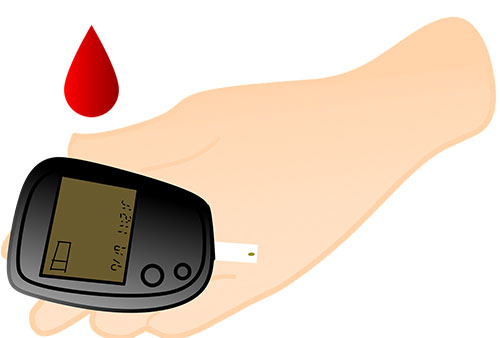Aaron McCloud
So, diabetic, you want to strengthen your heart? Sounds reasonable. After all, it’s a pretty vital organ.
There are about 34 million Americans with diagnosed diabetes—90-95% of those cases are type 2 diabetes, followed by gestational, and 1.25 million cases are type 1 diabetic (1).
I’m a type 1 diabetic, myself (dab it up), and a very healthy one at that.
But, as you know, it’s a hard, exhausting, and often frustrating disease to keep up with.
It wouldn’t be wise of me to speak for all diabetics, when I say our biggest fear is either stroke or heart attack. Let’s face it, those two things likely cross your mind at least once per year.
If not, well… you have achieved enlightenment.
Here are some tips on keeping that diabetic heart hardy, healthy, and happy.
1. Control Blood Sugar For Healthy Heart

Managing blood glucose levels should be the number one priority of every diabetic.
The first question every endocrinologist usually asks their patient is, “How have your sugar levels been?” Your correct answer should be, “Up and down, but mostly good.”
That’s when the doctor whips out your current A1c and validates your response.
High blood glucose levels over time will eventually wreak havoc on the body.
It should be on your top list of goals to manage your diabetes closely.
To minimize cardiovascular damage and reduce stress on the heart and vital organs, doctors recommend the hemoglobin A1c be under 7% (2).
One way to help control blood glucose better is to invest in a continuous glucose monitor (GCM). This is especially true for type 1 diabetes.
If you have never used one, it is strongly recommended that you at least try one out.
Medical technology has come a long way, and being able to accurately see your blood glucose patterns 24/7 can change the way you manage your diabetes.
2. Exercise Regularly To Strengthen Heart

Regular exercise is an important factor in controlling blood glucose and to strengthen a diabetic heart.
Not only will exercise help prevent obesity and strengthen the heart muscle, but it decreases insulin resistance—increasing insulin sensitivity.
This will allow your cells to better use available insulin to absorb sugar from the bloodstream, lowering blood glucose levels and A1c (3).
Have you ever taken insulin, in any form, including subcutaneous injections, and noticed your sugar level wasn’t going down? Almost like you were just injecting water?
Time passed, you waited thirty minutes, an hour, two hours, and your insulin never worked? You had to double, even triple the normal dose just for your sugar to go down?
Let’s assume the insulin wasn’t expired or spoiled, you weren’t sick, and you didn’t have unabsorbed food in your stomach. Well, it could be that your body had become…
resistant to insulin.
Exercising regularly can help fix this issue.
The American Diabetes Association (ADA) recommends at least two and a half hours of moderate physical activity per week (i.e., walking, swimming, jogging), or 75 minutes of running (4).
This is important for those with desk jobs who sit for prolonged periods of time. The ADA suggests diabetics move every 30 minutes, even if it’s just light walking.
3. Reduce Stress for heart health

Stressing because your A1c is over 7% and you exercise maybe 30 minutes per week?
It’s OK. There is always now to start making change.
Long-term stress is a factor that can contribute to increased blood pressure, blood sugar, and heart disease (5).
It’s easier said than done, but, just take it easy.
Out of all the variables in this article, stress is probably the hardest to manage. Especially as we get older, there are many things that can trigger it: work, health, kids, finances, our cat, etc.
The list of stressors goes on, and on.
For some of us, the way in which we respond to stress is due to genetics. And others, it can be adopted from our environment, like an influence—a learned behavior.
As diabetics, one of our biggest, if not our grandest stressor, is well, our diabetes. It’s more of an all-consuming stress, though; a stress that never goes away; one that haunts us in our dreams.
Don’t worry. Stress can be managed.
There are ways to cope with stress:
- Therapy and counseling.
- Managing symptoms of anxiety
- Talking with friends and family.
- Giving thanks for what you have.
- Investing in your dreams and setting short-term and long-term goals.
- Managing your health better
- Eat foods that boost your mood
- Accepting the things for which you cannot change.
Take it easy. Everything will be alright.
4. Food & Diet to strengthen diabetic heart

One of the best things a diabetic can do to manage their health and strengthen their heart is to eat a balanced diet. This includes eating foods that boost your immune system.
Try to eat less often foods that are high on the glycemic index (GI) rating system.
Basically, high GI foods break down quickly and rapidly spike your sugar, whereas low GI foods absorb more slowly.
- High GI foods include soda, white bread, white rice, ice cream (basically, the sweet stuff).
- Low & medium GI foods include beans, raw carrots, green vegetables, raisins, and rye bread.
As tasty as a bowl of 8 a.m. (or 8 p.m.) Fruity Pebbles is, it’s best to avoid eating that stuff.
Even the correct dose of insulin won’t save you from a postprandial spike from that high GI food. You will have to take your insulin MUCH sooner before you eat, and even then, your sugar will still spike.
So, is the sweet food worth it? You don’t have to answer that.
It’s important to note that you shouldn’t remove all the high GI foods from your diet.
A proper diet consists of a balance of low, medium, and high GI foods.
Research has shown that the amount of carbohydrates you eat influences your blood glucose levels the most after meals—not the food’s glycemic index rating (6).
In other words, eating a bowl of beans amounting to 70 grams of carbohydrates will have an effect on your body more than 40 grams of ice cream.
The ice cream might spike your sugar quicker, but overall, the beans will trigger your metabolism more and have a longer lasting effect on your blood sugar.
In the hierarchy of importance, reducing your total carbohydrate intake per meal takes priority over calculating where those foods rate in the GI system (6).
Ideally, though, you want to do both: account for the food’s GI rating, and limit carbs.
A well-balanced diet is necessary to strengthen a diabetic heart. It’s relying on you to keep those sugar levels down, and to also reduce your salt intake to under 2,500 milligrams a day (7).
Follow the nutrition guidelines of the American Diabetes Association (ADA).
5. Supplements & Vitamins for diabetic heart

Vitamins and supplements are a powerful way to incorporate essential nutrients and antioxidants into your diet.
There are promising medical abstracts out there regarding this topic and the many effects on the human body.
Beware, many false claims also exist, stating to be a “cure-all”. Do your own research.
Here are a few widely studied vitamins and compounds that have free-radical scavenging properties, and which are beneficial for the heart:
- Alpha-Lipoic Acid (antioxidant & anti-inflammatory)
- Organic White Tea (abundant flavonoids potent for the circulatory system)
- Coenzyme Q10 (reduces oxidative damage, reduces LDL cholesterol (8))
- Organic Black Raspberry Powder (extremely potent antioxidants)
- Cassia cinnamon (improves cholesterol and reduces cardiovascular disease (9))
- Green Superfood Powder (hefty load of vegetable & fruit antioxidants)
- Garlic (improves cholesterol & helps rid of artery plaque)
- Organic Turmeric Curcumin with BioPerine (powerful anti-inflammatory)
- Dark chocolate (high in flavonoids, lowers insulin resistance (10))
- Resveratrol (protects heart by regulating inflammation (11))
Remember, the body of a type 1 diabetic responds differently to supplements than a type 2 or gestational diabetic.
You might have noticed that omega-3 fatty acids were omitted from that list. There is a lot of conflicting data on how these acids affect the cardiovascular system in diabetics.
I’d like to use myself as an example. In 2015, I had pharmacogenetics testing done, and it showed that due to certain metabolizers in my body, I should avoid omega-3 fatty acids.
My endocrinologist, as a general rule of thumb, always told me it could be beneficial for me to consume an omega-3 fatty acid pill daily.
After showing him my pharmacogenetics analysis, he agreed that perhaps I should avoid them.
Supplements I personally take, 3-5 times per week:
- Organic White Tea (abundant flavonoids potent for the circulatory system)
- Turmeric Curcumin with BioPerine (organic powerful anti-inflammatory)
- Organic Black Raspberry Powder (extremely potent antioxidants)
- Green Superfood Powder (hefty load of vegetable & fruit antioxidants)
I’m not making claims, but I find these supplements to be helpful in reducing the oxidative stress of my type 1 diabetes, personally.
Consuming them, combined with no nicotine intake and an A1c under 6.4, I believe is protecting my cardiovascular system and preventing peripheral neuropathy and other diabetic complications.
Always consult your physician before considering new supplements.
6. Quit Using Tobacco, Diabetic!

Let’s face it, tobacco is no good, in any form. This is especially true for diabetics, who already suffer cardiovascular damage, amongst other conditions.
If I could use myself as an example again, I smoked cigarettes for 8 years, as a type 1 diabetic.
I know. Terrible. Those were my young and dumb years before I cared and, if I may add, gained all this wisdom.
I also had moderate peripheral neuropathy in my toes and left shoulder blade. It started to worry me. I could run a blade over my toe and not feel it.
However, I quit smoking. My neuropathy reversed itself—completely.
I now have no signs of nerve damage. My feeling returned to 100%, or close to it.
What’s the takeaway? Tobacco is not worth it.
The evidence is everywhere that smoking and/or chewing tobacco is detrimental to human health.
Besides the thousands of chemicals in chewing tobacco and the many carcinogens from smoke, nicotine itself has an effect on diabetes. Nicotine changes the way the body processes glucose (12).
Remember insulin resistance, and how it can cause your body to not respond well to insulin?
Nicotine too, alters those processes which let your cells respond to insulin. In other words, nicotine can cause your body to respond less to insulin.
Not only this, but nicotine can cause your body to make more triglycerides, contributing to atherosclerosis (hardening of the arteries due to plaque buildup). This increases your risk of stroke, heart attack, and heart disease (13).
You get the point. It’s hard to quit a tobacco addiction. I feel you.
Reducing to nicotine gum is a great first step! The next hurdle is to rid of nicotine completely.
To strengthen a diabetic heart, it is vital to not use tobacco, or nicotine.
7. Healthy Cholesterol for diabetic heart

Cholesterol is an essential lipid, and your body cannot live without it.
But there must be a balance of the good and bad.
There are two types of cholesterol—LDL (low-density lipoprotein, the bad) and HDL (high-density lipoprotein, the good).
HDL is “good” because it helps rid of excess cholesterol in your body by transporting it to your liver for expulsion. This helps to prevent plaque buildup and atherosclerosis caused from LDL cholesterol.
LDL is the “bad” one, because it goes straight to your arteries, collecting in your artery walls, and causing—you guessed it, atherosclerosis. This decreases blood flow and makes your heart work harder.
According to the American Heart Association (AHA), those pieces of plaque can break off in your arteries, causing a blood clot, and ultimately, heart attack, stroke, or heart failure.
Ideal cholesterol levels:
- An LDL cholesterol under 100 milligrams/deciliter (mg/dL) is considered ideal.
- 100-129 mg/dL is close to ideal.
- 130-159 mg/dL is borderline elevated.
So, how do we keep healthy cholesterol levels under 100 mg/dL?
Get routine blood work done, and always follow up with your primary care physician.
If you are diabetic and your triglycerides are over 100 mg/dL, your doctor might want to put you on a statin—a lipid-lowering medication. Also, it’s important that you keep your blood pressure at 120/80 or below (15).
Conclusion
It’s vital as a diabetic to keep your heart in good condition. This disease uncontrolled will ruin your body, and as you age, your heart will be affected. Start now, and do everything you can to protect your heart.
a quick recap of the topics we went over to strengthen your diabetic heart:
- Control your blood sugar.
- Exercise regularly.
- Reduce your stress and anxiety.
- Eat a well-balanced diet.
- Consider supplements and vitamins.
- Never use tobacco, or nicotine.
- Follow the AHA guidelines on maintaining healthy cholesterol.
That’s all folks! Thanks for reading.
Feel free to comment below if you liked this article on strengthening a diabetic heart with 7 powerful steps. I’d love to take questions or suggestions on other content you’d like to see on eHowdy!

How to Build a Satisfying Career Without a Five-Year Plan
We’re often told that the key to success is having a clear five-year plan: a set path that leads from point A to point B with no deviations. But what if you could build a career without rigid timelines or predefined steps? Here’s how to create a fulfilling professional life without feeling boxed in by the pressure of a fixed plan.

The Difference Between a Good Boss and a Career-Changing One
Not all bosses are created equal. Some are great at what they do—they lead teams, meet targets, and ensure things run smoothly. But then there are the career-changing bosses. The ones who don’t just help you get through your workday—they transform the way you see your career, your potential, and your path forward. Here’s how to tell the difference between the two.

Healthy Ambition vs. Internal Competition: There’s a Difference
Ambition isn’t the problem. It’s the pressure to outdo our past selves that can get quietly toxic. Many high achievers don’t compete with others—they compete with their own last milestone. The last raise. The last big win. That drive can be powerful, but left unchecked, it turns into a moving target that never lets you rest. Here’s how to recognize the difference between healthy growth and harmful self-comparison.
